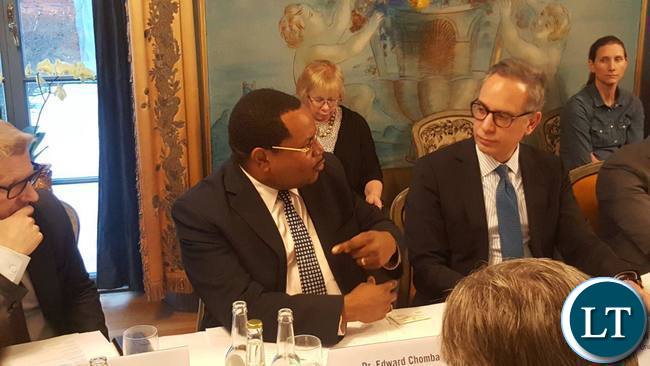

ZAMBIA has successfully lobbied to host the next Strategic Approach to International Chemical Management (SAICM) High Level meeting.
Delegates drawn from countries across the world who attended this year’s High Level SAICM meeting in Stockholm, last night agreed that Zambia was best suited to host the next event because of the impressive efforts the country was making in environmental management. Organisers will now move on to work out the dates and other logistics.
Permanent Secretary in the Ministry of Water Development, Sanitation and Environmental Protection, Dr. Edward Chomba, who campaigned for the hosting rights, is representing Zambia at the strategic meeting which was being held ahead of negotiations on a global chemicals agreement. The negotiations run from 13 – 15th March, 2018 in Stockholm. Zambia is being represented at the inter-sessional process meetings which will consider the strategic approach resolutions from the High Level dialogue by Operations Manager at the Zambia Environmental Management Agency (ZEMA), Mr. David Kapindula.
Current global cooperation in the area of chemicals relies on the SAICM approach, which runs until 2020 and the strategy meeting is meant to identify what framework would replace the current arrangement once it expired.
The high-level segment, which was hosted by Sweden’s Minister for the Environment, Ms. Karolina Skog, had representation from Brazil, Canada, Finland, France, Germany, Norway, South Africa, Switzerland, Uruguay and Zambia. Various international and local organisations which included the United Nations Environment and World Health Organisation also attended the meeting.
Dr. Chomba said Zambia was in support of the objectives of SAICM and commended the delegates for seeing value in the efforts that Zambia was making in sustainable environmental management and for giving the country an opportunity to host the next meeting. Dr. Chomba said Zambia was one of the leading countries in sub-Saharan Africa in mitigating the effects of environmental pollution. He pointed out that the country has implemented measures which were being spearheaded by ZEMA, and the Water Resources Management Authority in managing the various forms of pollution.
“We seem to be heading in the right direction. Other than from the mining sector, we don’t see much pollution except from the industries but that also is very much regulated. So if we continue on the same pace with regulation and compliance, which is a unit within these two regulators, then we will be scoring much more success,” he said.
The Permanent Secretary said it was regrettable that Zambia and other African countries were getting the brunt from climate change even when their levels of emission of waste into the environment was much lower than that of the developed world.
Dr. Chomba said it was important for a global approach towards the fight against chemical pollution as other countries were bound to suffer the effects in an event that one country did not take precautionary measures. He gave an example of the Zambezi River which he said sustained a number of countries in the region and that these would all suffer the consequences in an event that the water was contaminated at one point.
He told the delegates to be mindful that important policies in the past have been made at tables “such as this one but have failed because the people who are supposed to be the beneficiaries are never invited. We should include the church and the civil society because these groups are important agents of change.”
And Ms. Skog noted that chemicals had contributed to the development of the world but at the same time caused harm. She pointed out that the invitations were sent out to countries and other stakeholders whom Sweden realised were key to making the world a safer place.
“The current global scare from chemicals calls for global action. This process provides an opportunity to make chemical and waste a part of the sustainable development agenda. It is important to remember that the cost of being inactive is grave. I invited you because I see a coalition that will help us achieve an agenda through political will,” Ms. Skog said.
Sweden wants to form a coalition of ambitious countries to bring about a global framework for chemicals and waste, along the same lines as the Paris Agreement for climate.
And Zambia’s Ambassador to Sweden, Her Excellency Ms. Rose Salukatula has said that Zambia was happy to be part of the process and that the embassy in Stockholm will work hard to ensure that the country successfully hosts the next SAICM meeting.
Ms. Salukatula said hosting the event would encourage Zambia to even do more and give the country an opportunity to show case what it was doing in environmental management.


Lool ati Zed is next host bcuz of “Zambia’s impressive efforts in environmental management” .Did these people not see the filth on the streets and the cholera ??
@ Enka. What’s your problem imwe ba upnd kanshi? Every thing is bad what’s is your small spoiled god going to change? Sometimes appreciate the good things the government is doing.
HAVE NEVER SEEN A PARTY LIKE UPND IN MY LIFE. THEY OPPOSE EVERYTHING INCLUDING THE CALL OF NATURE.
WHY CLERGYMEN WHEN IN POLITICS REMOVE THEIR TITLE ..THIS MAN IS A BISHOP BUT PREFERS TO BE CALLED DR. EDWARD CHOMBA, ALSO FATHER BWALYA SAYS JUST CALL ME FRANK BWALYA ITS ONLY REV.SUMAILI ZODWA who has maintained her clergyship tittle. On current topic please when lobbying say the truth that we are a filthy country thus why 300 pipo died of chinye nyenye also CO 2 EMMISSION IS VERY HIGH BECAUSE ZAMBIANS BUY USED CARS FROM JAPAN , ONLY POLITICAL CORRUPT LEADERS AFFORD BRAND NEW CARS FROM TOYOTA ZAMBIA, WE HAVE NO INDUSTRIES AND MINES ARE AT LIBERTY TO POLLUTE OUR RIVERS .If u lobby like this u can get funding but u speak on the good side who shall consider funding u ..UBUTUTU
Comments are closed.